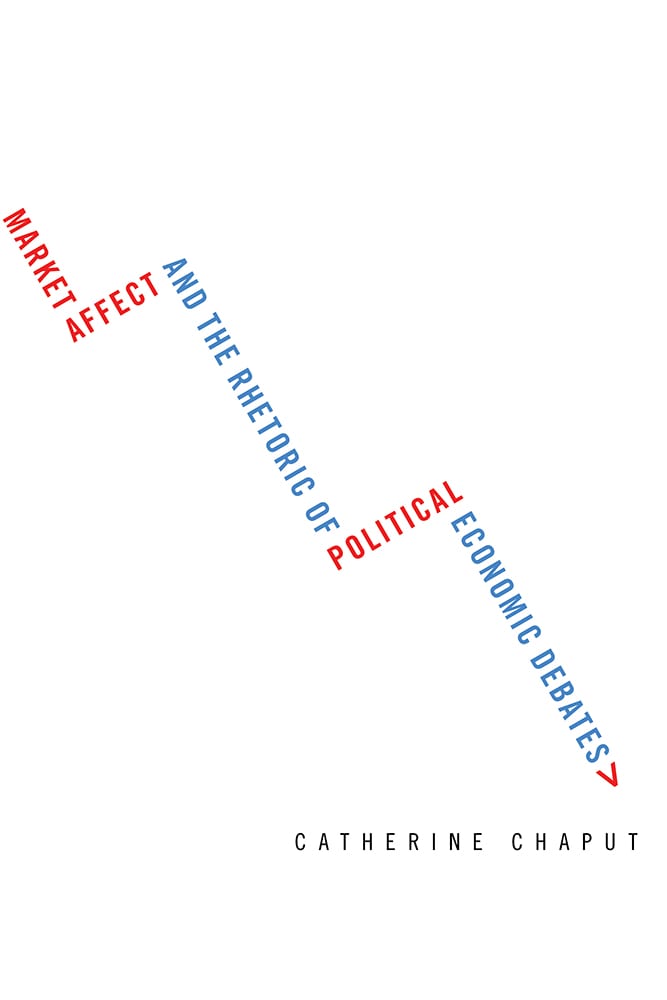What explains the "triumph of capitalism"? Why do people so often respond positively to discussions favoring it while shutting down arguments against it? Overwhelmingly theories regarding capitalism's resilience have focused on individual choice bolstered by careful rhetorical argumentation. In this penetrating study, however, Catherine Chaput shows that something more than choice is at work in capitalism's ability to thrive in public practice and imagination—more even than material resources (power) and cultural imperialism (ideology). That "something," she contends, is market affect.
Affect, says Chaput, signifies a semi-autonomous entity circulating through individuals and groups. Physiological in nature but moving across cultural, material, and environmental boundaries, affect has three functions: it opens or closes individual receptivity; it pulls or pushes individual identification; and it raises or lowers individual energies. This novel approach begins by connecting affect to rhetorical theory and offers a method for tracking its three modalities in relation to economic markets. Each of the following chapters compares a major theorist of capitalism with one of his important critics, beginning with the juxtaposition of Adam Smith and Karl Marx, who set the agenda not only for arguments endorsing and critiquing capitalism but also for the affective energies associated with these positions. Subsequent chapters restage this initial debate through pairs of economic theorists—John Maynard Keynes and Thorstein Veblen, Friedrich Hayek and Theodor Adorno, and Milton Friedman and John Kenneth Galbraith—who represent key historical moments. In each case, Chaput demonstrates, capitalism's critics have fallen short in their rhetorical effectiveness.
Chaput concludes by exploring possibilities for escaping the straitjacket imposed by these debates. In particular she points to the biopolitical lectures of Michel Foucault as offering a framework for more persuasive anticapitalist critiques by reconstituting people's conscious understandings as well as their natural instincts.
Catherine Chaput is an associate professor of English at the University of Nevada, Reno. With M. J. Braun and Danika M. Brown, she coedited the anthology Entertaining Fear: Rhetoric and the Political Economy of Social Control.
"Market Affect and the Rhetoric of Political Economic Debates is not only a landmark intervention into the rhetoric of economics but also one of the most important advances in rhetorical theory in decades. By carefully interweaving the rhetorical tradition with contemporary studies of affect and materiality, Chaput provides a powerful reformulation of key concepts like agency, identification, and persuasion."—Kendall R. Phillips, Syracuse University
"If affect shapes the market and if the market moves us rhetorically, then economics can explain capitalist rhetoric. Historians, economists, and rhetorical theorists will value Chaput's erudite analyses and the conclusion to her genealogy: Smith, Keynes, Hayek, and Friedman persuaded with their 'superior affective sensibility."—Mark Garrett Longaker, University of Texas at Austin
"In addition to making specific, compelling, and timely arguments about the function and effects of affect in political economic debate, the ambitious scale and scope of Market Affect and the Rhetoric of Political Economic Debates make it an essential resource for understanding the entanglements and possibilities of rhetorical theory in the contemporary moment."—Rhetoric Review
"Market Affect exemplifies the kind of intervention that a rhetorically attuned scholar can bring to pressing political-economic debates. . . . [T]his is a powerful contribution from a notable scholar."—Philosophy & Rhetoric
